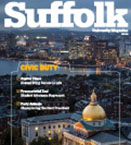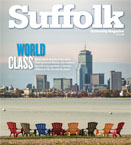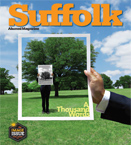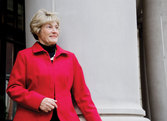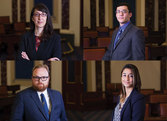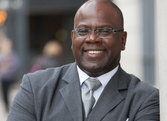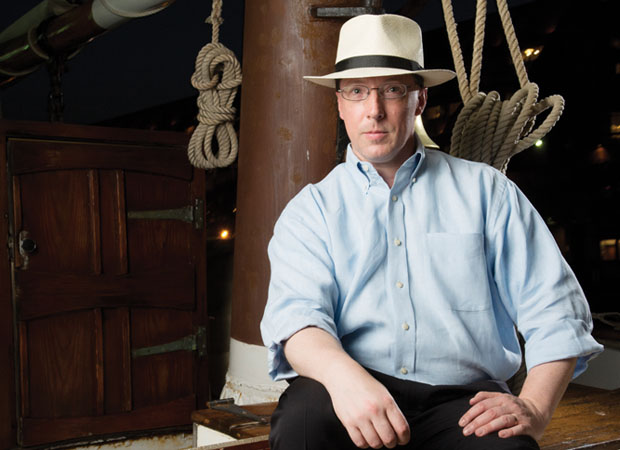
Booty Camp
A treasure trove of pirate lore awaits students who make it into historian Stephen O’Neill’s coveted course
By Sam Tremont
If William Kidd, perhaps the most infamous pirate of all time, were alive today, he might well be inclined to seek retribution against Stephen O’Neill. “It’s extraordinary that he has this reputation,” the Suffolk University senior lecturer tells his class, describing Captain Kidd as “one of the most famous pirates and one of the worst ... kind of a thug, not a natural leader” and “a coward” who “in the end becomes a kind of pathetic figure.” To a legend seeking to protect his hardcore cred, these might well be construed as fighting words. Fortunately, O’Neill has history on his side. Drawing upon meticulous research including contemporary firsthand accounts, newspaper reports, execution sermons, and trial transcripts, as well as historians’ perspectives, he debunks myths about pirate royalty like Kidd while introducing lesser-known characters such as New York Governor Benjamin Fletcher, “a great patron of pirates” and “one of the most corrupt officials ever.”
For his History of Piracy course, O’Neill has led students on a tavern tour of Boston pirate haunts and invited guest speakers, including maritime archaeologists who dove on pirate wrecks. But the compressed seven-week summer term schedule means that this afternoon, he will stand before a packed classroom and, barely glancing at his notes, deliver a three-hour tour de force on pirates of the 1690s and Captain Kidd. At various points, O’Neill will break into song, deliver a humorous aside, and respond to a steady stream of questions. (Shannon Day ’15 notes that he “encourages participation without ever needing to require it.”) It all feels more like a performance by the kind of gifted storyteller who draws the crowds at Faneuil Hall rather than a lecture in a classroom setting.
History has always been an exercise in storytelling for this native of the Massachusetts South Shore. “I can remember when I was about 5 or 6, my father let me stay up late one night to watch the old movie Captain Blood with him,” O’Neill recalls. “It had pirates, sword fighting, ships, and plus, I got to stay up late alongside my father. That memory stayed with me through the years as a combination of some of my various interests: movies, history, sword fighting [and] pirates.”
O’Neill majored in English at Boston College and returned for a Masters of American Studies, researching “the golden age” of piracy (1660-1730) with a focus on pirates executed in Boston. His first jobs were at the Museum of Fine Arts, Plimoth Plantation, and the Social Law Library in Suffolk County Courthouse. There, he created exhibits for the Supreme Judicial Court Historical Society on legal events such as the Boston Massacre trials. In 1999, his exhibit called Pirates on Trial in Puritan Boston was installed at the Old State House. Through working with Boston-area historic groups, O’Neill met Robert Allison, professor and chair of Suffolk’s history department. They discussed a course on piracy, which O’Neill began teaching in 2005. Since then, he has added classes on the history of Plymouth colony and a material culture course called American Objects in History.
“Stephen O’Neill is a deceptive teacher,” Allison observes. “His students are having so much fun, and are so engaged in the subject … that they read all of the many books that he assigns, they write the papers that he requires, they will not miss a class, and they are not aware that they are actually learning history. It is not surprising how many times students comment on his evaluations ‘the best course I’ve taken in four years,’ or how many students fight to get into his classes.” Emily Sichel BA ’12, MED ’14, who majored in European history, considers History of Piracy “my favorite class as an undergraduate.” Yet even a business major who took the course as an elective, Michael Piantedosi BSBA ’10, calls it “the best decision I ever made,” and Jesse Norris BS ’11, who majored in psychology, says “it was both my first and favorite class at Suffolk.” Day, a law student, says, “Professor O’Neill obviously loves to teach, loves the information and material he shares with his students, and loves learning himself. This dedication and passion for education transfers to his students, and his class is always that one that no matter how tired you are or how rainy it is outside, you want to be in his classroom.”
O’Neill, who has spent the past 10 years as associate director and curator of collections at Pilgrim Hall Museum in Plymouth, say that “pirates are a fantastic subject to teach because not only am I enthusiastic about them, my students are as well.” Yet, he notes, “if my students are asked why they take this course before they sign up for it, they will usually answer something like ‘Pirates are awesome.’ But when they find out how much there really is to discover about the subject, they find that [it’s] far more complex and far more interesting than they had imagined. By using pirates as ‘the example,’ students are taught the methodologies for interpreting any historical subject.”
